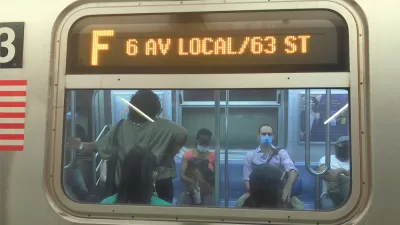Seatback signage and reduced capacity will allow King County Metro to begin resuming bus service. In the wake of staff illness and depleted funding, the road to Metro's recovery could be quite long.

After three successive service cuts starting in mid-March, King County Metro announced Monday that some buses will resume service. The plan to restore service includes extra trips on several routes and fare-free rides through the month of May.
"Service cuts have primarily affected weekday service, resulting in nearly a 30% reduction of trips. The latest counts indicate that weekday bus ridership has somewhat stabilized at around a 73% drop over last year," writes Stephen Fesler. The most stable ridership since the onset of the pandemic has come from primarily low-income, urban communities that rely heavily on public transit day-to-day. Extra bust trips are prioritizing services in these areas where the coronavirus has least impacted ridership.
In addition to increased trips, signage will be installed in transit vehicles to promote the observance of social distancing mandates. Starting in the next two weeks, signage will include placards placed on seatbacks to enforce social distancing, "limiting capacity on buses to 12 riders on 40-foot buses and 18 riders on 60-foot buses." Metro will also continue to request that symptomatic riders to refrain from using their services and will require all riders to wear masks.
Despite these restrictions and requirements, several metro staff members have been exposed to the coronavirus and contracted COVID-19, including one operator who died from the disease. Given these concerns and financial distress due to the lack of federal assistance, Metro is expected to have a difficult time recovering from the decrease in ridership.
FULL STORY: Metro Restoring Some Bus Trips To Meet Demand, Installing More Social Distancing Signage

Planetizen Federal Action Tracker
A weekly monitor of how Trump’s orders and actions are impacting planners and planning in America.

Chicago’s Ghost Rails
Just beneath the surface of the modern city lie the remnants of its expansive early 20th-century streetcar system.

San Antonio and Austin are Fusing Into one Massive Megaregion
The region spanning the two central Texas cities is growing fast, posing challenges for local infrastructure and water supplies.

Since Zion's Shuttles Went Electric “The Smog is Gone”
Visitors to Zion National Park can enjoy the canyon via the nation’s first fully electric park shuttle system.

Trump Distributing DOT Safety Funds at 1/10 Rate of Biden
Funds for Safe Streets and other transportation safety and equity programs are being held up by administrative reviews and conflicts with the Trump administration’s priorities.

German Cities Subsidize Taxis for Women Amid Wave of Violence
Free or low-cost taxi rides can help women navigate cities more safely, but critics say the programs don't address the root causes of violence against women.
Urban Design for Planners 1: Software Tools
This six-course series explores essential urban design concepts using open source software and equips planners with the tools they need to participate fully in the urban design process.
Planning for Universal Design
Learn the tools for implementing Universal Design in planning regulations.
planning NEXT
Appalachian Highlands Housing Partners
Mpact (founded as Rail~Volution)
City of Camden Redevelopment Agency
City of Astoria
City of Portland
City of Laramie





























